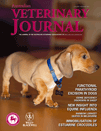
AUSTRALIAN VETERINARY JOURNAL
Scope & Guideline
Advancing veterinary science since 1925.
Introduction
Aims and Scopes
- Veterinary Clinical Research:
The journal publishes studies on clinical cases, treatment methodologies, and surgical techniques across various animal species, emphasizing evidence-based practices. - Epidemiology and Disease Management:
Research on the epidemiology of infectious diseases affecting both domestic and wildlife populations is a core focus, aiming to inform prevention and control strategies. - Animal Welfare and Ethics:
The journal addresses issues related to animal welfare, humane treatment, and the ethical considerations in veterinary practice, promoting best practices in animal care. - Public Health and Zoonoses:
Research on zoonotic diseases and the intersection of animal health and public health is highlighted, reflecting the important role veterinarians play in community health. - Veterinary Education and Professional Development:
The journal explores veterinary education, training methodologies, and the professional development of veterinary practitioners to improve the quality of veterinary services. - Conservation Medicine:
Contributions on wildlife health and conservation efforts are included, addressing the challenges of maintaining biodiversity and ecosystem health in the context of veterinary science.
Trending and Emerging
- Emerging Infectious Diseases:
There is an increasing focus on emerging infectious diseases, particularly those affecting wildlife and livestock, reflecting heightened awareness of zoonotic risks and the need for robust surveillance systems. - Antimicrobial Resistance (AMR):
Research addressing antimicrobial resistance in various animal populations is gaining momentum, emphasizing the critical need for responsible prescribing practices and alternative treatment strategies. - Veterinary Mental Health and Well-being:
The journal has seen a rise in articles discussing mental health issues within the veterinary profession, highlighting the importance of addressing stress, burnout, and overall well-being among veterinary practitioners. - Innovative Treatment Modalities:
There is a notable increase in studies investigating novel treatment approaches and technologies in veterinary medicine, including regenerative medicine and advanced surgical techniques. - One Health Approach:
The integration of human, animal, and environmental health into a One Health framework is becoming more prevalent, emphasizing collaborative efforts to address complex health issues. - Wildlife Health and Conservation:
Research focusing on the health of wildlife populations and conservation strategies is emerging as a significant area of interest, reflecting the growing recognition of the importance of biodiversity for ecosystem health.
Declining or Waning
- Traditional Agricultural Veterinary Practices:
Research focused on conventional practices in agricultural veterinary medicine, such as standard health protocols for livestock, has seen a decrease in frequency, possibly due to a shift towards more innovative and integrated approaches. - Species-Specific Diseases in Domestic Animals:
There has been a noticeable reduction in studies solely focused on common diseases in domestic species, as the journal increasingly prioritizes broader epidemiological studies and multidisciplinary approaches. - Single-Species Studies:
Publications concentrating on single species, particularly in isolation, are declining. There is a growing preference for studies that encompass multi-species perspectives or comparative analyses. - Historical Veterinary Practices:
Research exploring historical veterinary practices and their evolution is less frequently featured, indicating a shift towards contemporary issues and future-oriented veterinary science.
Similar Journals
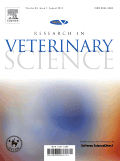
RESEARCH IN VETERINARY SCIENCE
Transforming Animal Care Through Groundbreaking StudiesRESEARCH IN VETERINARY SCIENCE, published by Elsevier Science Ltd, stands as an authoritative platform in the field of veterinary studies. With its origins dating back to 1965, this prestigious journal is recognized for its contribution to the advancement of veterinary knowledge and practices, boasting a remarkable Q1 categorization in Veterinary (miscellaneous) and ranking 24th out of 194 in the Scopus veterinary general category, placing it in the top 13% of its field. The journal presents a diverse range of research articles that explore critical topics in veterinary science, thereby facilitating evidence-based practices and innovations. Although currently not an open-access journal, it remains highly accessible through institutional and personal subscriptions, allowing researchers, professionals, and students to benefit from its rich collection of studies. As it moves toward 2024, RESEARCH IN VETERINARY SCIENCE continues to be a vital resource for those dedicated to improving animal health and advancing veterinary science.

Acta Veterinaria Eurasia
Fostering collaboration in veterinary studies worldwide.Acta Veterinaria Eurasia is a prominent open access journal dedicated to advancing the field of veterinary sciences. Published by AVES since 2002, it aims to provide a platform for innovative research and insights that enhance veterinary practices and animal welfare. With its ISSN 2618-639X and E-ISSN 2619-905X, the journal has established a growing international reputation, particularly in Turkey, and is indexed in major databases. As of 2023, it is positioned in Q4 of the Veterinary (miscellaneous) category and holds a Scopus rank of #138 out of 194 in the general veterinary domain, placing it in the 29th percentile. The journal spans a broad scope within veterinary studies, inviting contributions that foster knowledge dissemination and collaboration among researchers, professionals, and students alike. By promoting open access since its inception, Acta Veterinaria Eurasia is committed to making cutting-edge research accessible to all, ultimately supporting improved health outcomes in veterinary practice.
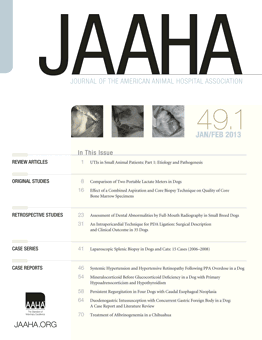
JOURNAL OF THE AMERICAN ANIMAL HOSPITAL ASSOCIATION
Elevating standards in veterinary medicine with cutting-edge insights.JOURNAL OF THE AMERICAN ANIMAL HOSPITAL ASSOCIATION (ISSN: 0587-2871, E-ISSN: 1547-3317), published by the American Animal Hospital Association, is a premier resource for veterinary professionals, researchers, and students focusing on the field of veterinary medicine. Established in 1973, this esteemed journal serves as a vital platform for disseminating cutting-edge research and clinical insights in the management and care of small animals, boasting a remarkable Q1 ranking in Small Animals and a Q2 ranking in Medicine (miscellaneous), reflecting its high impact in the field. With a Scopus rank of #6 in the veterinary small animals category and a 72nd percentile standing, it offers valuable content covering a diverse range of topics pertinent to animal health and welfare. Although not open access, the journal provides essential resources that contribute significantly to the ongoing professional development of veterinary practitioners and the broader scientific community, thus solidifying its status as a cornerstone of veterinary literature.
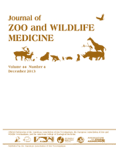
JOURNAL OF ZOO AND WILDLIFE MEDICINE
Enhancing animal welfare through impactful research.JOURNAL OF ZOO AND WILDLIFE MEDICINE, published by the American Association of Zoo Veterinarians, serves as a pivotal resource in the field of veterinary science, focusing specifically on the health and well-being of zoo and wildlife species. With an ISSN of 1042-7260 and an E-ISSN of 1937-2825, this journal is recognized for its significant contributions to animal science and has been categorized in the second quartile in both Animal Science and Zoology, as well as Veterinary disciplines, according to the latest rankings. It holds a respectable position within Scopus, being ranked #91 in General Veterinary and #290 in Animal Science and Zoology. While the journal operates on a subscription basis, its impactful research articles have been invaluable for clinicians, researchers, and students alike, providing crucial insights that advance wildlife conservation, veterinary practices, and animal health care from 1993 to the present. With a global reach and a targeted focus on both theoretical and practical applications, JOURNAL OF ZOO AND WILDLIFE MEDICINE is instrumental in fostering collaboration among professionals dedicated to the study and care of wild animal populations.

AUSTRAL JOURNAL OF VETERINARY SCIENCES
Empowering Research, Enhancing Animal WelfareAUSTRAL JOURNAL OF VETERINARY SCIENCES is a prominent platform for innovative research in the field of veterinary science, published by UNIV AUSTRAL CHILE, FAC CIENCIAS VETERINARIAS. This journal, bearing the ISSN 0719-8000 and E-ISSN 0719-8132, serves as a vital resource for researchers, veterinarians, and students interested in advancing their knowledge in veterinary practices and animal health. With its influence reflected in its Q3 category ranking in the Veterinary (miscellaneous) field, and its Scopus rank of #95 out of 194, the journal highlights a robust commitment to disseminating valuable findings and insights. Between the years 2017 to 2024, it aims to provide open access to significant advancements and discussions in veterinary science, ensuring that vital research is accessible to a global audience. Located in Valdivia, Chile, the journal emphasizes its role in enhancing veterinary scholarship and fostering professional development within the community.

MAGYAR ALLATORVOSOK LAPJA
Shaping the Future of Veterinary PracticeMAGYAR ALLATORVOSOK LAPJA is a prominent journal dedicated to the field of veterinary science, published by MEZOGAZDA KIADO KFT in Hungary. With its inaugural issue dating back to 1950 and a continued presence into 2024, this journal serves as a vital platform for disseminating research and advancements in veterinary medicine and related areas. While the journal currently holds a Q4 classification in the Veterinary (miscellaneous) category, it provides a critical outlet for emerging findings and perspectives that may not be covered in more mainstream publications. Researchers, professionals, and students engaged in the veterinary field will benefit from its diverse range of articles, which are crucial for fostering knowledge and innovation in veterinary practice. Though it does not offer an open access option, the journal remains an essential resource for those looking to deepen their understanding of the veterinary landscape. The commitment to advancing the field is evident in every publication, making MAGYAR ALLATORVOSOK LAPJA a noteworthy contribution to veterinary literature.

ACTA VETERINARIA SCANDINAVICA
Pioneering interdisciplinary research for animal health.ACTA VETERINARIA SCANDINAVICA is a prestigious open-access journal dedicated to advancing the field of veterinary science and promoting interdisciplinary research. Published by BMC since 2001, this journal has become a vital resource for veterinarians, researchers, and students worldwide, with an ISSN of 0044-605X and an E-ISSN of 1751-0147. With a remarkable impact factor reflecting its relevance—ranking in the Q2 quartile for Veterinary (miscellaneous) and Q3 for Medicine (miscellaneous)—ACTA VETERINARIA SCANDINAVICA focuses on a broad spectrum of veterinary topics, ensuring that critical research is available to the academic community and beyond. Located in the United Kingdom, this journal has successfully converged its publishing efforts from 1960 to 2024, highlighting its long-standing commitment to veterinary excellence. Researchers are encouraged to submit their work through the journal’s user-friendly platform, contributing to the ever-evolving landscape of animal health and welfare.

REVISTA CIENTIFICA-FACULTAD DE CIENCIAS VETERINARIAS
Unlocking insights for a sustainable future in veterinary science.REVISTA CIENTIFICA-FACULTAD DE CIENCIAS VETERINARIAS, published by the Universidad del Zulia, is a prominent open-access journal dedicated to advancing the fields of veterinary science, animal science, and food science. Since its inception in 1997, the journal has served as a vital platform for disseminating quality research and fostering academic dialogue among professionals and scholars in the veterinary and agricultural sectors. With its commitment to open access since 2010, the journal aims to make valuable research freely accessible to a global audience, thereby contributing to the advancement of scientific knowledge. Although currently categorized in the bottom quartile of various fields—including Animal Science and Zoology, Food Science, and Immunology—REVISTA CIENTIFICA-FACULTAD DE CIENCIAS VETERINARIAS is dedicated to nurturing innovative research that addresses pressing challenges in veterinary and related sciences. Researchers, professionals, and students will find this journal to be an important resource for quality studies that have implications for animal health, food safety, and biotechnology in the context of Venezuelan and international landscapes.

Thai Journal of Veterinary Medicine
Bridging the gap between veterinary research and real-world application.Thai Journal of Veterinary Medicine, published by Chulalongkorn University, serves as a vital resource for researchers, practitioners, and students in the field of veterinary science. With an ISSN of 0125-6491, the journal has been providing a platform for the dissemination of original research and reviews since its inception, with a focus on advancing veterinary practice and animal health in Thailand and the broader Southeast Asian region. The journal is recognized in the Scopus database, currently ranked in the Q4 category for Veterinary (miscellaneous), reflecting its commitment to quality despite being in a highly competitive space. The scope of the journal encompasses a wide array of topics pertinent to veterinary medicine, ensuring accessibility to diverse veterinary disciplines. While the journal currently does not offer an open-access option, it remains dedicated to contributing valuable knowledge and insights to the veterinary community, supporting the improvement of animal welfare and public health initiatives in the region. As it continues to publish until 2024, the Thai Journal of Veterinary Medicine invites contributions that align with its objectives of fostering scholarly discourse and advancing veterinary research.
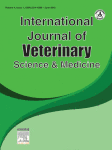
International Journal of Veterinary Science and Medicine
Bridging research and practice in veterinary medicine.Welcome to the International Journal of Veterinary Science and Medicine, a leading platform for the dissemination of innovative research in the field of veterinary science. Published by TAYLOR & FRANCIS LTD, this esteemed journal has maintained an Open Access policy since 2013, ensuring widespread accessibility and engagement with cutting-edge veterinary studies. With an impressive impact factor and a Category Quartile ranking of Q1 in Veterinary (miscellaneous) as of 2023, it stands out as one of the top journals in its field, ranking #16 out of 194 in the Scopus Veterinary category, placing it in the 92nd percentile of academic publications. The journal encourages submissions of high-quality research and articles that contribute to advancements in veterinary medicine, ranging from clinical studies to public health implications. Located in the United Kingdom, the journal aims to foster collaboration and communication among veterinary professionals, researchers, and students, making it an indispensable resource for anyone involved in this vital field.